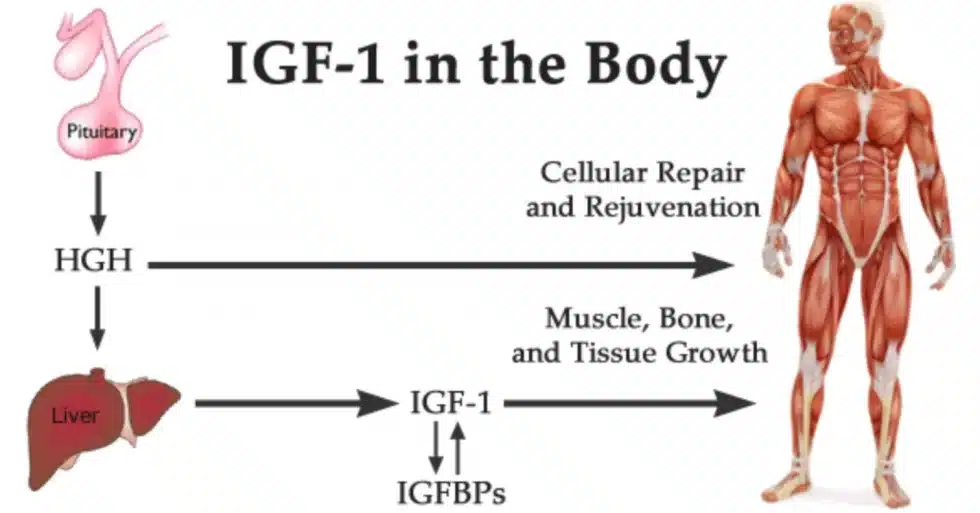IGF-1 +Tesamorelin
The human body naturally produces growth factor hormones all your life, but the levels will change depending on your age and lifestyle. The levels of insulin-like growth factor 1, responsible for promoting energy, a robust immune system, enhanced fat burning, stronger bones, youthful-looking skin, speed up healing, repair muscle tissue, and athletic physique, peak around your early 20s and start to decline around middle age rapidly. This is the reason, so many middle-aged people begin looking for anti-aging supplements—they feel much older than they actually are.
Once people start learning more about insulin-like growth factor 1, or IGF-1, will begin to wonder how it compares with human growth hormone, which people regularly use. HGH (human growth hormone) and IGF-1 (Insulin-like Growth Factor) are closely related steroid hormones that stimulate muscle and bone growth. Growth hormone is produced in the pituitary gland, deep in the brain, and it circulates through the blood to the liver, where it stimulates the production of IGF-1. In addition to the liver, there are local producers of IGF-1 in the body and the brain. Most of the effects of growth hormones are mediated through IGF-1.
IGF-1 is part of an ancient signaling system that promotes growth in many species. The system includes insulin, a protein structurally very similar to IGF-1 (hence the name). Insulin is a mediator of lifespan regulation through food, exercise, and energy metabolism. Some proteins carry instructions in the blood; they attach to receptors on the surface of a cell and tell the cell what to do. Others get inside the cell and play a more direct role in the chemistry. IGF-1 does both. It has “both endocrine and autocrine functions.”

HGH is seen as a sort of youth serum and has been used as a treatment for weakness, low energy, and depression in the elderly. IGF-1 combats the loss of muscle mass in old age, both by promoting new tissue growth and retarding apoptosis (cell suicide that protects against infection and cancer, but that can kill healthy cells as we get older). IGF-1 promotes new nerve growth in the brain and has been linked to increased cognitive performance as well as subjective feelings of youth and well-being. IGF-1 protects the heart and arteries from deterioration with age. Low IGF-1 may lead to insulin resistance, diabetes symptoms, and cardiovascular disease.

FAQ’s
IGF-1 offers all of the same benefits as HGH, without any of the harmful effects. First, let us explain how the medication works. The real difference between the two ingredients becomes apparent when you begin administering them. When you inject natural IGF-1, your body will replenish its levels to their optimal amount, and then filter out the excess through the kidneys. All while, your body will still be producing its own insulin-like growth factor 1. However, on the other hand, when you inject with HGH, your body will stop producing the hormone, causing the medication to do the opposite of what they were intended to do.
No, because over-the-counter supplements are usually amino acids like L-arginine, L-glutamine, L-ornithine. While high doses of these compounds sometimes produce a release of growth hormone from the pituitary gland, the effect is small. Also, for supplements to provide an increase in serum growth hormone, they must be consumed in very high doses, which can cause kidney and liver problems. Additionally, HGH cannot be taken orally because the stomach would digest it as it does food, resulting in no therapeutic effect in the body. For HGH to work, it must be injected.
Using Tesamorelin before bedtime, and IGF-1 in the morning will 10X your results. Tesamorelin is a small molecule that stimulates the brain to produce growth hormones. Tesamorelin is a growth hormone-releasing hormone analog that increases IGF-1 levels in men and women, by an average of 181 micrograms/liter. This is by far the BEST & MOST EFFECTIVE peptide we’ve ever worked with. It binds to and stimulates GHRH receptors with similar potency as endogenous GHRH. It has a host of other benefits including nootropic effects and reducing triglycerides. Tesamorelin has subsequently been shown to decrease carotid intima-media thickness, visceral adipose tissue (VAT), and c-reactive protein (CRP). It has not been linked to significantly affect other pituitary hormones and their respective mechanisms in the body. Additionally, it can improve cognitive function for healthy seniors and patients with an increased risk of Alzheimer’s disease, due to mild cognitive impairment.
Here is a study about the benefits of Tesamorelin by the National Center for Biotechnology Information (NCBI) – Click here
Here is a study about the benefits of IGF-1 by PubMed Central (PMC) – Click here

